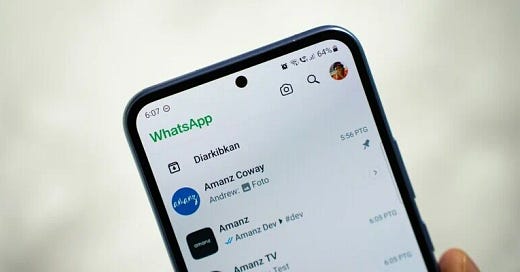Meta unleashes ads on WhatsApp
With advertising, the company aims to significantly boost monetization of its messaging app
WhatsApp has held out for sixteen years before giving in to the lure of advertising. But the messaging app will soon begin displaying ads, its parent company Meta announced on Monday. The goal: to significantly accelerate the platform’s monetization process, and finally recoup the $19 billion spent in 2014 to acquire it – not to mention the investments made since.
But this move is doubly sensitive. On one hand, alternatives known for better protecting user privacy, such as Telegram and Signal, are growing in popularity. On the other hand, the Noyb association has already announced its intention to take the matter to authorities for violating the European GDPR. “Your personal messages, calls and groups you are in will not be used to determine the ads you may see,” Meta tries to reassure users.
Meta changes its stance
The idea of showing ads on WhatsApp is a long-standing issue. Initially, Jan Koum, the app's founder and CEO, firmly opposed it, preferring a paid model – one dollar per year. When Meta acquired the app, Mark Zuckerberg agreed with this approach, stating that ads were not “the best way to monetize messaging services.”
Instead, Facebook’s CEO chose a different path: charging businesses small fees to communicate with WhatsApp’s two billion users. However, he later changed his position. In 2019, shortly after Jan Koum’s dramatic resignation, the company announced plans to launch ads. For five years, the project remained officially on the roadmap, without materializing.
WhatsApp plans to gradually display ads in the Status section – its version of the Stories feature popularized by Snapchat and later copied by Meta. This format currently attracts 1.5 billion daily users. However, no ads will appear in the inbox, unlike on Messenger, Meta’s other messaging app.
Only “limited information” to target users ?
The company promises to use only “limited information” to target users, such as their country and the channels they follow. But it also notes that it may use data collected from Facebook and Instagram if users have linked their accounts. This account-linking feature, launched earlier this year, is marketed as a way to more easily share content across all Meta platforms.
Despite the more limited targeting options, which will translate to lower prices for advertisers, analysts believe WhatsApp’s advertising potential is significant. The messaging app already generates several billion dollars in revenue annually, thanks to paid messages and click-to-message ads sold on Facebook and Instagram that redirect users to a WhatsApp conversation with the advertiser.
As Meta undertakes major investments, particularly in generative AI, the company now aims to go even further in monetization. It will soon launch paid subscriptions on WhatsApp, allowing channels to post content reserved for paying subscribers. It will also enable businesses to promote their channels in order to gain followers.




